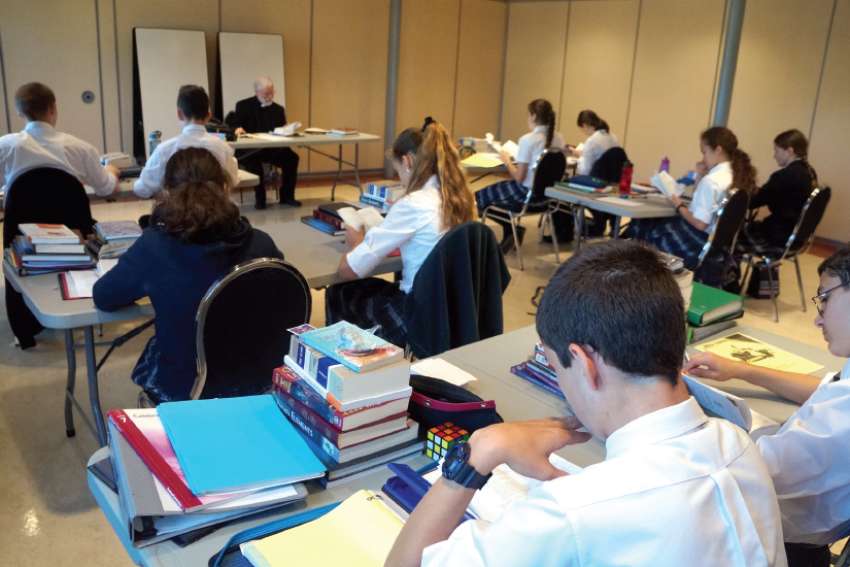He knew he had to throw his hat in the ring.
The New Brunswick native did an interview over the phone with board members of Ottawa’s Chesterton Academy last May.
“Before I even had the job officially, I quit my other job, and started packing up my boxes and sent them to Ottawa,” said Stevens. “At one point I had no home, I had no job, and a wife that was seven months pregnant. All on a prayer the Chesterton Academy was going to take off.
“When I sent in my resignation letter, I thought this is either going to work or I’ll be living in my parents’ basement at age 31,” he said.
Stevens, a father of three children under six years old, is now principal of the Chesterton Academy that has 10 students in Grades 9 and 10. Next year, the school hopes to add Grade 11, and the following year Grade 12.
The school is part of the Chesterton Schools Network, named after the renowned Catholic writer G.K. Chesterton. The first Chesterton Academy began in the twin cities of Minneapolis and St. Paul, Minn., in 2008.
The Chesterton network offers an alternative type of Catholic education. It provides those who are interested in joining the expanding network a template on how to open and operate a school that features a curriculum that emphasizes the classics.
Students at the Ottawa Academy, for instance, study the philosophers Homer, Plato and Aristotle; writers such as Dante, Chaucer, Shakespeare and Chesterton; and the works of such Catholic luminaries as St. Francis of Assisi, St. Thomas Aquinas, St. Teresa of Avila. Latin is mandatory. The Chesterton model integrates the sciences and humanities so that “the logic of math is seen in philosophy, and God’s handiwork is seen in the sciences.”
The Ottawa school is the first Chesterton Academy in Canada; there are 16 similar schools in the United States and one in Italy.
St. George’s Parish hosts the new school, designating portions of its parish hall for classrooms and offices.
Besides his headmaster duties, Stevens also teaches math and science.
“The big advantage for me as a teacher, is (the curriculum) is very well structured and it makes logical sense on how one idea progresses into the next,” Stevens said. Each year builds on the previous year and all the courses are interconnected to make the program “more coherent.”
“What they are doing in history lines up with what they are doing in literature, and in philosophy,” he said. “Looking at people thinking and writing in same time period, we see the same ideas come in different subjects.
“The curriculum goes year by year through different ages,” he said. “Right now, the students are in the Ancient Period. They are looking at pro-Socratic philosophers and early human history to the birth of Jesus, then they move on from there.
“Every year is divvied into a specific time period, until Grade 12, where the students study the modern period,” Stevens said.
“In Canada, in the western world, we don’t know why we are the way we are,” Stevens said. “Something is not right with the way we think, not that western culture is bad in any stretch, but a lot of it is we’ve fallen away from traditional knowledge, what would have been commonplace for people to know.”
Dr. John Gay, a retired physician and co-founder and CEO of Justin Press, a small Catholic publishing house in Ottawa, chairs the board of the Ottawa Chesterton Academy. He said he stumbled across information about the Chesterton Schools network “quite by accident.”
“I was impressed by the fact it had a well-designed, field-tested curriculum,” said Gay. “I thought ‘What a tremendous advantage this is in starting up a school.’
“Many school projects founder on the establishment of a curriculum,” he said, noting the Chesterton curriculum “had stood the test of 10 years experience and was propagating itself.”
Gay began telling others about the network and “a group of parents coalesced around the idea,” he said.
“Not all responded, but enough did and we were able to form a board and to proceed very well from there,” he said.
“We got the school up and running in a matter of months from our first meeting earlier this year. Normally, the Chesterton people tell us it takes at least a year and a half or more.”
The school has almost as many teachers as students: two full time, including Stevens; two part-time, and “three volunteer teachers without whom we could not function,” Gay said.
“We are a long way from being financially independent of donors, though we have been the recipients of generous donations from a variety of sources and will continue to depend on that for the foreseeable future.”
The parents of the students at the academy are “aware of the shortcomings of the (public) Catholic school system and want to protect their children,” Gay said.
“They are willing to take the risk that the school might in some way fail. There’s no sign of that. The parents are very satisfied with the curriculum.
“The teaching method is Socratic, involving a conversation between the teacher and the student about the material that student has been assigned to read in advance,” Gay said. If a student is assigned to read a passage of Plato, they discuss it the following day.
The Socratic method, as opposed to the traditional lecture method, “draws out the student’s understanding and allows the teacher to identify gaps” and “address them directly,” Gay said.
“We’re counting on good report of parents to make the school grow for the next several years,” Gay said.


